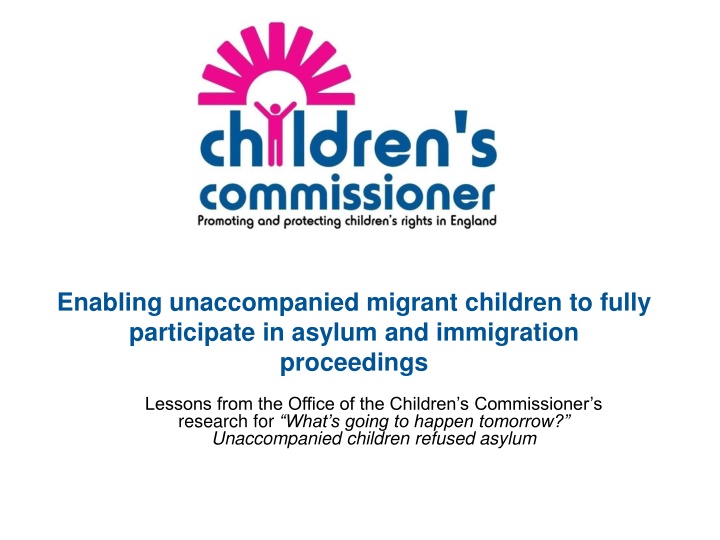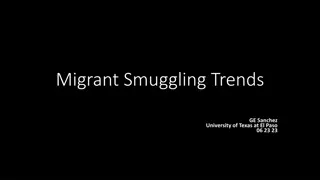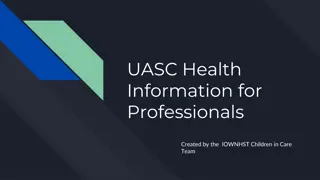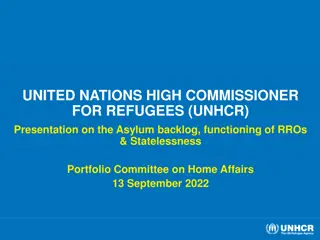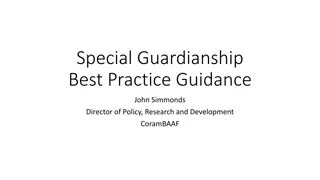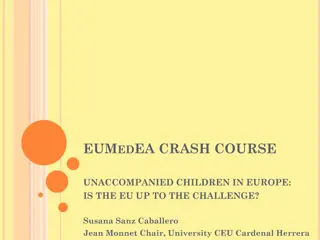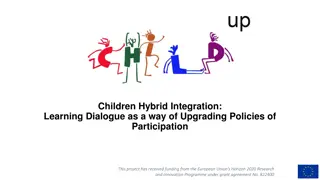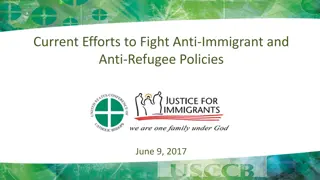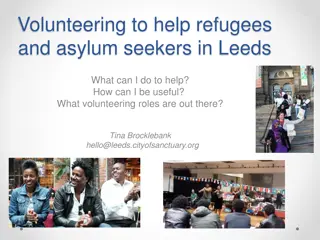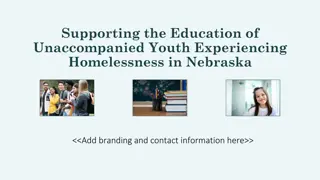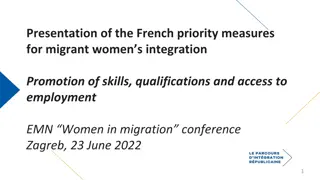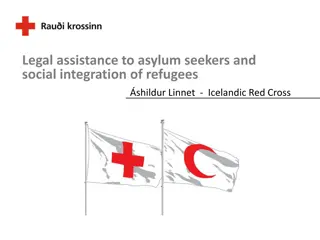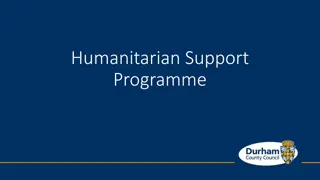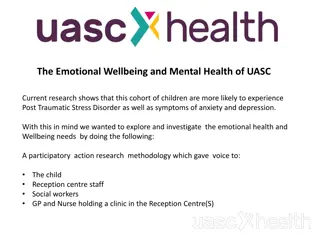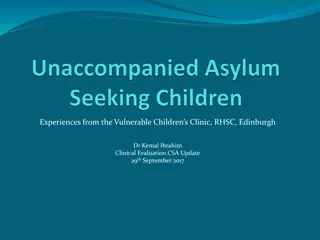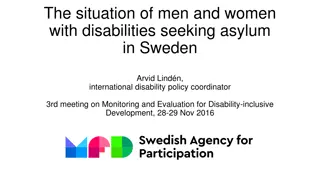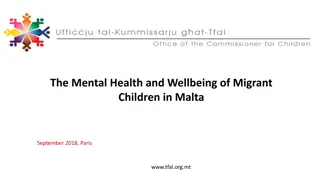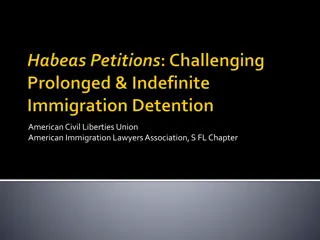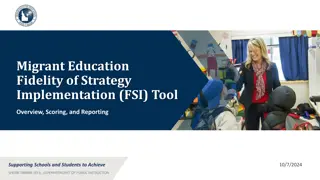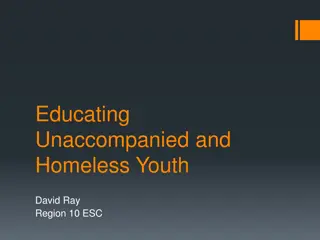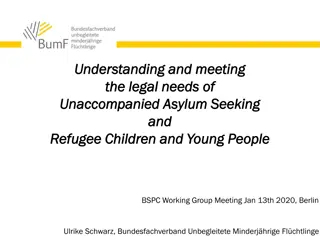Fostering Unaccompanied Migrant Children's Participation in Asylum Proceedings
Enabling unaccompanied migrant children to participate fully in asylum and immigration proceedings is crucial to ensuring their voices are heard, relevant information is presented, and their wishes are considered. Their participation can lead to outcomes aligned with their desires and help them plan for the future. Children have the right to express their views freely, as stated in Article 12 of the UN Convention on the Rights of the Child. However, barriers such as understanding of legal processes and lack of agency involvement can impede children's participation.
Uploaded on Sep 14, 2024 | 0 Views
Download Presentation

Please find below an Image/Link to download the presentation.
The content on the website is provided AS IS for your information and personal use only. It may not be sold, licensed, or shared on other websites without obtaining consent from the author.If you encounter any issues during the download, it is possible that the publisher has removed the file from their server.
You are allowed to download the files provided on this website for personal or commercial use, subject to the condition that they are used lawfully. All files are the property of their respective owners.
The content on the website is provided AS IS for your information and personal use only. It may not be sold, licensed, or shared on other websites without obtaining consent from the author.
E N D
Presentation Transcript
Enabling unaccompanied migrant children to fully participate in asylum and immigration proceedings Lessons from the Office of the Children s Commissioner s research for What s going to happen tomorrow? Unaccompanied children refused asylum
Why the childs full participation is so important Enabling participation in proceedings can ensure that the child s voice is heard and that as much relevant information as possible is put before the decision maker. Enabling participation can provide a sense of assurance to the child that they have been listened to and that their views and wishes have been taken into account whatever the outcome of their application. Enabling participation is likely to lead to an outcome consistent with the child s wishes and even where it doesn t, can help the child come to terms with, and plan for, their future.
Children have a right to participate! Article 12 UN Convention on the Rights of the Child says: 1. States Parties shall assure to the child who is capable of forming his or her own views the right to express those views freely in all matters affecting the child, the views of the child being given due weight in accordance with the age and maturity of the child. 2. For this purpose, the child shall in particular be provided the opportunity to be heard in any judicial and administrative proceedings affecting the child, either directly, or through a representative or an appropriate body, in a manner consistent with the procedural rules of national law.
Interpretation of Article 12 (General Comment Number 6) Right of the child to express his or her views freely Pursuant to Article 12 of the Convention, in determining the measures to be adopted with regard to unaccompanied and separated children, the child s views and wishes should be elicited and taken into account (Article 12.1). To allow for a well formed expression of such views and wishes it is imperative that such children are provided with all relevant information concerning, for example, their entitlements, services available including means of communication, the asylum process, family tracing and the situation in their country of origin. In guardianship, care and accommodation arrangements, and legal representation, children s views should be taken into account. Such information must be provided in a manner that is appropriate to the maturity and level of understanding of each child. As participation is dependent on reliable communication, where necessary, interpreters should be made available at all stages of the procedure.
Barriers to childrens participation The constraints on children s participation include: The understanding that separated and unaccompanied children bring to the legal process. Agencies lack of ownership of the task of ensuring children obtain quality representation. Formal gaps and constraints embedded in the legal process.
Childrens expectations and understanding of the legal process they are embarking on Newly arrived children do not necessarily realise that they need to go through a legal process in order to be recognised and therefore allowed to settle for good. You start off thinking where to go and how to start a new life. When you go to the Home Office you don t know anything about the system of the UK. While Government and organisational priorities are to move quickly into determining the young person s status, this is not the priority that young people ascribe to themselves. The first thing is very important is to have an education and to learn the rules, how to speak to people and to make friends.
Childrens understanding of the legal process that they are embarking on Migrant children may come from backgrounds where the concept of the law does not include help or assistance to secure rights . It s very hard for children to understand or conceive of a system that works under the Rule of Law as their experience of justice is not around the State being able to protect you but more likely a village elder dispensing local justice according to custom. This may mean that at first children don t even understand the need for a lawyer to assist them through the process: They [Home Office] didn t say why you needed a solicitor. He just asked, You need a solicitor or not So how are we to know? We can t know this. How are we to know why you need a solicitor? At the first time when I came in there, I went to Home Office and Home Office ask me, Do you need a solicitor? I said, What for solicitor? I don t know?
Lack of ownership of the task of ensuring children can participate through accessing quality representation Council Directive 2013/32/EU (the re-cast Procedures Directive) requires Member States to: take measures as soon as possible to ensure that a representative represents and assists the unaccompanied minor to enable him or her to benefit from the rights and comply with the obligations provided for in this Directive. Who ensures this in the UK? Statutory guidance is fairly weak: Unaccompanied and trafficked children subject to immigration control will need access to specialised legal advice & support . This will be in relation to immigration and asylum applications , decisions and court proceedings. If they have been trafficked it may also be in relation to criminal proceedings or compensation claims. The child s social worker or carer should arrange for them to be accompanied in all meetings with legal professionals.
Lack of ownership of the task of ensuring children can participate through accessing quality representation Refugee Council Children s Panel and a few other NGO s lack the statutory authority to appoint a legal representative on behalf of a child. They are also unable to meet with every unaccompanied or separated child who arrives in the UK. Children will seek out representation on a needs be basis and are as likely to turn to peers for advice as to their carers. When I move into the lodging then there s a boy. So he introduced me to a solicitor. So that s how I found her. And I introduced more people. My friend needed a solicitor because the Home Office they gave up a paper to him. The solicitor needed to fill that paper and my friend didn t have a solicitor. That s why I introduced him.
Formal gaps and constraints embedded in the legal process (1) The Legal Aid regime structural factors that frustrate the provision of good quality representation. Not all bad some safeguards built in; remunerated at hourly rate rather than fixed fee but the cap is unrealistic. Good representation not possible within the cap and applying for an extension is time-consuming and not adequately remunerated. Single biggest problem now is that immigration (as distinct from asylum) is out of scope of the Legal Aid regime no exception for children.
The representatives job in ensuring a childs full participation in their initial claim The 800 cap for making the initial claim covers the following work: introductions and building rapport with the child explanation of the roles of different parties and procedures entitlements and status pending the asylum claim taking instructions on the child s history, family, fears and events leading up to departure or escape drafting the statement reading the statement back to the child to ensure accuracy advice and preparation prior to the Home Office substantive interview going through the Home Office substantive interview record with the child to identify any mistakes or ambiguities and where necessary explaining these in writing to the decision maker Evidence may also need to be obtained from witnesses, carers or other third parties to put before the decision maker.
Formal gaps and constraints embedded in the legal process (2) The dilemma for legal reps in the post-LASPO era A child may be unable to articulate their fears due to their capacity and minority. For example, we recently had a case where the child said very little about their feelings and fears but evidence from their foster carer confirmed that the child suffered from nightmares causing distress and bedwetting. Both the foster carer and the social worker were seeking professional help and support for the child. It was vital that this evidence was gathered and put before the decision maker. Unfortunately, lawyers have been put in the difficult position where acting in the best interests of their child clients comes second to the financial viability of their firm or organisation for fear of being nil assessed (not paid for the work that they have done). Lawyers no longer feel able to take evidence from a child s carer or relevant third party as this may be misconstrued by the LAA as being linked to an Article 8 application rather than the child s international protection claim. It can be crucial to explore the environment of the child in the UK to understand their fear of return. A child may be able to explain why they fear return only once they have had an opportunity to understand and discuss why they feel safe here.
The grant of limited leave how a failure to fully participate places children at risk Although refugee recognition rates have risen for unaccompanied children recently, the majority are given limited leave to remain until age 17 and a half. To obtain representation on appeal against refusal of asylum the legal representative must apply a merits test . Many are failed and this often goes unchallenged. Where the limited leave granted is less than one year there is a statutory bar on appealing (which will soon go). Children acquiesce in the grant of limited leave as they are told they can extend it when they reach 17 and a half and the nature of the leave is either not explained or understood by them.
Visa or deferred removal? Children and young people s understanding of the grant of limited leave I thought it was visa, the same as you were saying, I got visa, that s it. [On who explained Discretionary Leave] The first person was my foster carer, and you ve got three years and two months. So I didn t care that much about it, I said OK . And after a while, my social worker explained it to me as well so that It s OK at the moment so this is what have you got. So you can wait, and then you can apply for the extension that s what I listened to, her voice. So that s what I did. I didn t argue about it, or appeal or anything. At that time, you have actually been refused, and given permission to live only for one year. You don t know that. The solicitor s job is to ask you, What could you get more proof of? for instance. When I get the discretionary leave to remain here the first time I didn t even know that when I ll be 18 I ll be sent back. I didn t understand, cos there was this translator from Iran and I didn t even understand what he was saying to me.
Whats going to happen tomorrow? Unaccompanied children refused asylum The report is available at: http://www.childrenscommissioner.gov.uk/cont ent/publications/content_794 A children s version of the report is available at: http://www.childrenscommissioner.gov.uk/cont ent/publications/content_795
